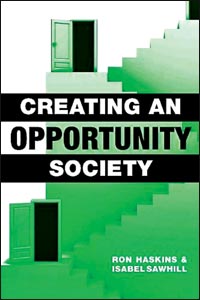American dream needs repair
Clive Crook
Sooner or later the US will find itself grappling with an immense
fiscal problem. The recession and stimulus have combined to produce
record-breaking deficits, and economic recovery will not come close to
restoring balance. US voters have big questions to answer about the
entitlements they demand and the taxes they are willing to pay.
This dismal outlook might not seem the ideal setting for a call to
new ambition in US social policy. But that is exactly what Isabel
Sawhill and Ron Haskins, scholars at the Brookings Institution, issue in
their new book, Creating an Opportunity Society.
Unreal as such a summons might seem just now, the authors should be
congratulated for refusing to be deflected, and not only because their
book is full of excellent analysis and proposals. In two ways, their
effort turns out to be well timed after all.
|

Isabel Sawhill and Ron Haskins’s new book, Creating an
Opportunity Society |
It shows that rigorous fiscal discipline and ambitious social policy
can be combined, which many politicians are apt to forget. It also shows
that centrism, politically feasible policies, designed to appeal to
moderates of left and right, need not be timid. Learning these lessons
is the key to breaking the fiscal impasse, and more besides.
Many Americans think they live in a society which, more than most,
offers citizens the chance to prosper. The US is not the most equal
society in the world, and does not want to be. What matters is that a
poor man can raise himself up.
Creating an Opportunity Society begins by showing that, especially
for the poorest children, this is something of a myth. By international
standards, intergenerational mobility in the US is quite low. This will
surprise few who have ventured into a US public housing project or
troubled inner-city school, but many middle-class Americans never have.
The figures show that US children born in the lowest and highest
quintiles of the income distribution are more likely to stay there than
in Britain, for example, and much more likely than in countries such as
Sweden and Denmark.
But what to do about it? The book confirms a finding well established
in the literature, that transition to the middle class is all but
guaranteed for poor children if they do three things: finish high
school, work full time and marry before having children. The US
underperforms as an opportunity society because so many of its young
people fail at one or more. The book focuses on these areas.
Education, as the Obama administration recognizes, is pivotal. The
book calls for gradual increases in spending on early education programs
for the poor, an exceptionally productive investment according to all
the research.
The authors also suggest policies to improve schools, such as
adopting national standards (a strengthening of the state-based
standards of the No Child Left Behind law); new federal incentives (like
those being introduced by the Obama administration) to encourage the
hiring and retention of good teachers; and support for 'paternalistic'
schools that stress order, good attendance, basic skills and frequent
assessment. Teachers' unions find plenty to object to here.
Incentives to find and stay in work could be improved by extending
the earned-income tax credit, say the authors, and through support for
vocational training. But work requirements under the 1990s welfare
reforms should be maintained or tightened, they say. At this many
liberals will bridle, as they will at the claim that the 'success
sequence' of school, employment, and children after marriage requires
firmer pro-family suasion and incentives.
FT |



